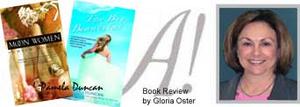

Ashevlle-area native Pamela Duncan published Moon Women in 2002 and continues the saga of this family of women with The Big Beautiful, debuting this month.
The first novel introduces readers to three generations of hard scrabble, working class women whose interactions reinforce a theme of interconnectedness among female family members. The second novel focuses on Cassandra Moon, a 42-year-old, never-married day care owner.
In the first novel, Marvelle is oldest of the Moon women and the mother of Ruth Ann and Cassandra. Ashley is the daughter of Ruth Ann. Their histories intertwine to create a multi-layered narrative of women bonding to navigate both small and momentous events in the river of life. Births, deaths, drug addiction, illness, divorce, Christmas, birthdays and suicides - all are faced with emotion, yet also with equanimity due to the synergy created by the representative of each generation. Ruth Ann, a divorced, laid-off mill worker, discovers a new life in her 50s; Marvelle, her mother - a victim of Alzheimer's - recalls hardships of raising her children during the Depression.
Marvelle dishes out wisdom in moments of lucidity-especially to Ashley, Ruth Ann's pregnant daughter. These women face problems that all women do, thus their stories are universal despite the fact that they happen to live in the mountains of Western North Carolina.
Although reading the first novel is not a necessity for understanding the second, knowledge of the Moon women's history contextualizes Cassandra's fleeing the church at the moment she is to walk down the aisle to marry Dennis, the local funeral director. Cassandra compares herself to Charlotte Lucas, the character in Pride and Prejudice who "settles" by marrying Mr. Collins. As Cassandra constructs this comparison, she recalls the characters from the movie rather than the book, a clue to her cultural orientation.
Described in the first novel as "...a natural born snuggler, big and soft and slow and easygoing," Cassandra is Duncan's primary subject in The Big Beautiful. She evolves through her desire to escape the influences of her family, despite the love and respect she has for them all.
Still in her wedding dress on the opening pages of the novel, Cassandra drives Dennis's limousine to Salter Path, North Carolina, on the Outer Banks, the home of her Aunt May and Uncle Walton. After running out of gas, she drinks the champagne intended for her honeymoon, sleeps in the car, and is comically rescued by Hector who drives her to a hotel, becoming her savior of sorts. The plot, with lots of humorous touches, consists of Cassandra's reacquainting herself with family, making a host of new friends, and learning how to respond to her own heart's desires.
The exotic environment, with its warm ocean breezes and turtle eggs hatching on the beach, so different from the mountains she has fled, allows Cassandra the opportunity to learn to love herself as well as others. The characters in these two novels are complex enough to keep the reader interested, despite the fact that each book is more than 300 pages long. A couple of stylistic elements, however, seem condescending to both characters and readers. In Moon Women, the characters' consistent misuse of nearly every verb's principal part seems forced and inconsistent with the language of today's Appalachia. Granted, all rules of the Queen'sEnglish are not honored here or anywhere else for that matter. Consequently, the Moon women could be forgiven for making more than even the occasional slip in verb usage, but their constant misuse of verbs lacks authenticity.
In The Big Beautiful, the two main characters, Cassandra and Hector, have names that are prominently linked to the Trojan War as related in Homer's Iliad. Cassandra, her gift of prophecy doomed to be ignored, warns of the catastrophe of bringing the Trojan horse inside the walls of the city, and Hector, the bravest of Trojan warriors, is slain by the Greek Achilles. Distinct literary allusions in modern works leave the reader expecting some symbolic connection to their predecessors. In Duncan's novel, none seems to exist.
The title takes its fire from a poem written by Jane Hicks, a resident of the Tri-Cities. It perfectly expresses Cassandra's desire to make choices that will determine her own fate rather than conforming to the expectations of others. The end of the poem states:
.
..I freed
my hair, pin by pin from the veil
that bound it, lace floated free
to shroud driftwood, my sister,
cast here by fortune and forces.
Night settled serene and perfect,
folded me into the big beautiful.
Both novels about the Moon women will resonate with people who love their families and want their support, yet simultaneously yearn to freely venture into risky, unexplored territory. In such a space, no advice is wanted unless solicited - not even from family!
About the reviewer: Gloria Oster teaches English at King College and is a member of A! Magazine's Editorial Committee.